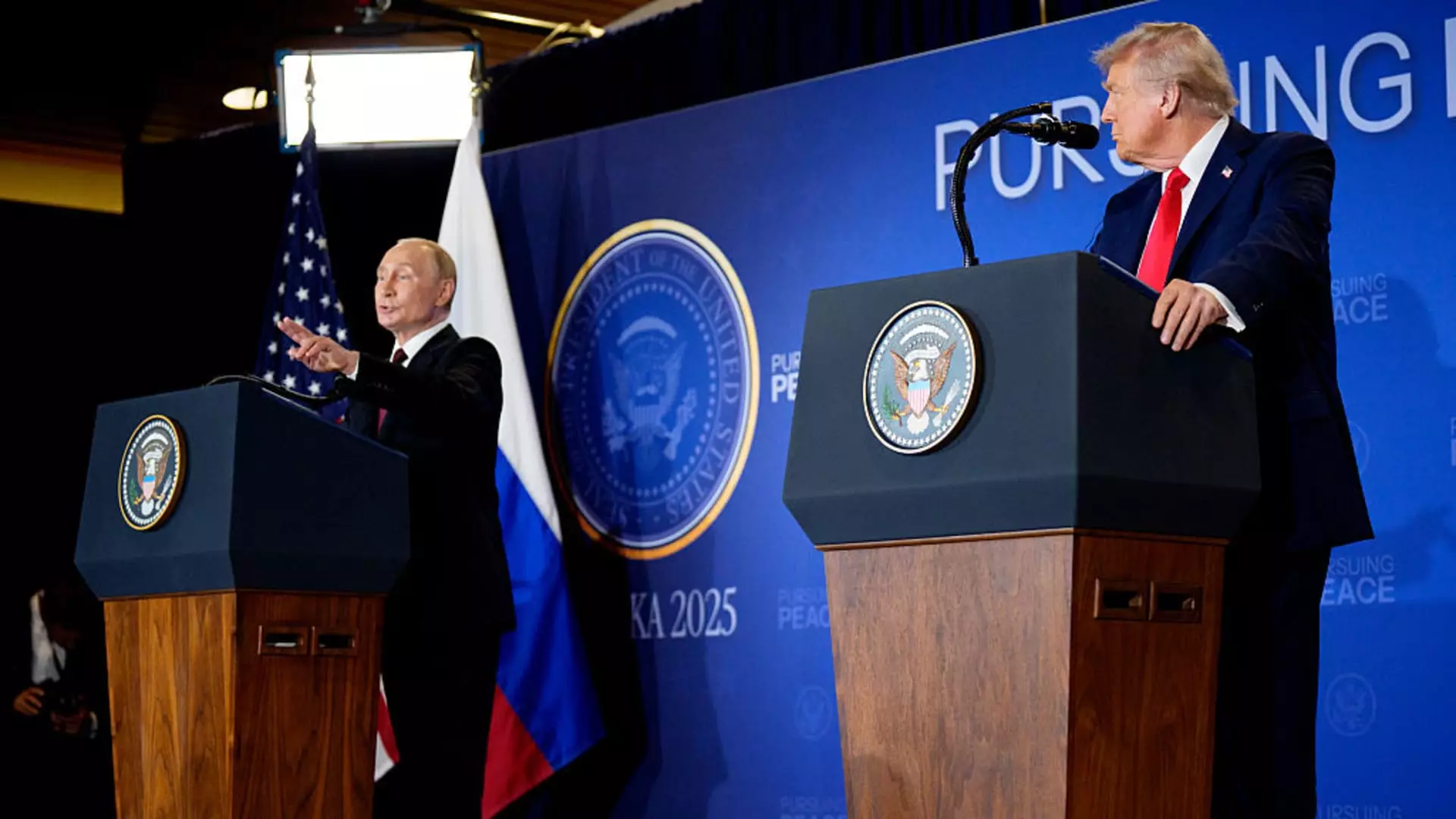The recent summit between U.S. President Donald Trump and Russian President Vladimir Putin was framed as a significant diplomatic event, yet beneath the polished veneer lies a stark reality: it was neither substantive nor promising. The White House’s attempt to downplay the purpose—describing it merely as “a listening exercise”—smacks of superficiality. Genuine diplomacy requires tangible progress and transparency; what transpired was a choreographed exercise that left many questions unanswered and hopes dashed. Instead of genuine negotiations, what viewers saw was a spectacle that prioritized optics over substance, reinforcing the notion that this summit was more about window dressing than real change.
Furthermore, Trump’s characterization of the meeting as “productive” lacks credibility given the absence of any meaningful outcomes. His own statement, “There’s no deal until there’s a deal,” reveals an acknowledgment of the many unresolved issues hanging over the negotiations. It’s a clear indication that the talks are stuck in limbo, echoing the longstanding deadlock surrounding Ukraine and broader U.S.-Russia relations. Such vague reassurances foster false optimism, masking the underlying stagnation that characterizes these high-level discussions. This ongoing stagnation only serves to reinforce the failed diplomacy that has characterized U.S.-Russia interactions over the past years.
The Illusion of Progress and the Silence on Ukraine
One of the most disturbing aspects of the summit was the conspicuous exclusion of Ukraine from the dialogue. President Zelenskyy’s plea for a multilateral negotiation involving Ukraine, the U.S., and Russia underscores a glaring failure: the summit was not aimed at resolving the conflict but rather at placating the major powers without regard for Ukraine’s sovereignty or voice. The absence of Ukraine from the negotiation table signals an unsettling prioritization of geopolitical convenience over human rights and national sovereignty.
This focus on “big powers” negotiating behind closed doors underscores a dangerous pattern of sidelining smaller, impacted nations. Such a dynamic risks empowering authoritarian tendencies, as negotiations seem increasingly divorced from the realities faced by those caught in conflicts they did not instigate. The potential for deals that compromise Ukraine’s territorial integrity is an ominous sign, revealing a reckless disregard for international law and democratic principles. Diplomacy devoid of inclusivity or accountability erodes trust and perpetuates cycles of conflict, rather than paving the way for genuine peace.
Rhetoric of Reconciliation or Strategic Posturing?
Vladimir Putin’s characterization of the talks as merely a “starting point” hints at Moscow’s desire to frame negotiations as preliminary steps rather than definitive solutions. His mention that relations have “fallen to the lowest point since the Cold War” tacitly admits that years of strategic posturing and aggressive policies have eroded mutual trust. For Putin, this summit is less a path toward resolution and more a strategic move to regain diplomatic ground, especially after a decade of strained U.S.-Russia relations.
Trump’s comments about having “many points that we agreed on” and that they are close to some “significant” deals read as ambiguous at best. The lack of detailed elaboration exposes the true nature of these talks: vague promises that serve no one but the political optics. By refusing to take questions from the press, the leaders dodged accountability, shielding their diplomatic misadventures from public scrutiny. Their evasiveness feeds the perception that these negotiations are driven more by strategic positioning than genuine policy initiatives aimed at ending conflicts or repairing relations.
Additionally, Trump’s plan to consult NATO and Zelenskyy suggests a reflexive approach rather than a thoughtful strategy. It implies that U.S. leadership remains reactive, more responsive to internal politics and geopolitical posturing than committed to meaningful peace. This posture risks further destabilizing already fragile international relations and undermines any prospects for a fair resolution.
A Dysfunctional Status Quo with Long-Term Consequences
The underlying reality of this summit is a predictable continuation of a failed diplomatic paradigm—a cycle of encore summits and ephemeral declarations that produce little real change. Despite multiple negotiations over Ukraine, a peace settlement remains elusive, exposing the core flaw: a lack of collective commitment to conflict resolution grounded in respect, diplomacy, and international law. Instead, continuing negotiations are weaponized as tools for strategic game-playing rather than genuine attempts to forge peace.
Russian media’s uplifted tone and Ukrainian apprehension highlight a broader truth: diplomacy has become a tool for power plays, often at the expense of justice and human rights. The summit exemplifies how the West’s approach—featuring cautious, often superficial engagement—has failed to catalyze meaningful progress. Instead, it reinforces a dangerous global pattern where conflicts are prolonged, and sovereignty becomes a bargaining chip rather than a fundamental right. Without a radical shift in approach—centered on accountability, inclusivity, and genuine intentions—these summits will remain empty rituals, emblematic of the flaws embedded within the current international diplomatic system.

